Year 2025

Mr. Sunil Ariyarathna
Born on December 19, 1949, in Nungamugoda, Kelaniya, he received his education at Waragoda D. B. Jayathilaka Vidyalaya and Dharmaloka Vidyalaya, Kelaniya. From his childhood, he displayed a strong talent for singing. Introduced to the film industry by his elder brother, the renowned cinematographer Sathischandra Edirisinghe, he made his debut as a playback singer in the 1973 film “Mathara Aachchi”, with the song “Sandakada Pahanaka Ketyam Opala”, composed by Dr. Victor Rathnayake. The song gained him instant popularity overnight.
He further enhanced his musical knowledge under P. V. Nandasiri, a master musician, and in 1973, he traveled to India to pursue formal studies in music. The songs “Kuda Game Maddahane” from the film Hulavali and “Hise Gini Awilethe” from Sri Madara are among the milestones of his illustrious singing career.
His first independent song was “Vadakayaneni Obē Sitharaya”, and during a Radio Ceylon evaluation conducted by Indian musicologist Dipali Naag, he was classified as a Grade A vocalist. His exceptional singing talent earned him prestigious awards, including the Sarasavi, Presidential, and Swarna Sankha Awards.
Following in the footsteps of greats such as Ananda Samarakoon, Sunil Santha, and Pandit Amaradeva, Sunil Edirisinghe helped nurture and elevate the genre of refined Sri Lankan music in the 1980s, alongside maestros Prof. Sanath Nandasiri and Dr. Victor Rathnayake. His serene, melodious voice emerged as an uplifting light in the nation’s musical landscape.
Driven by deep, sincere love for the art, he transformed singing into a social service, touching the hearts of his listeners. It is worth remembering that he also performed the theme song of the Sumathi Awards Ceremony, titled “Rangana Narthana Tharaga Sarasiyē”. His melodious voice has also enriched many television dramas throughout his career.
At the 30th Sumathi Awards Ceremony, the once in a life time ‘Sumathipala Memorial Award’ in memory of Late U. W. Sumathipala (the founder of the Sumathi Group) and late Milina Sumathipala, was awarded to the veteran vocalist Sunil Jayapriya Edirisinghe, affectionately known as Sunil Edirisinghe, in recognition of his more than five decades of dedicated service to Sri Lankan music.
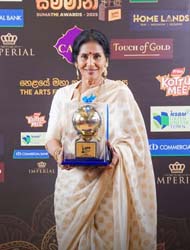
Mrs. Veena Jayakodi
Virginia Sandhya Peiris, who entered acting through her mother’s heritage — the popular actress and director Rohini Jayakody — was born on 27 November 1952 as her second daughter. When she appeared in the 1954 film "Ahankara Stri" (Proud Woman) as a baby, she was only about three months old. Having acted continuously from such a young age to the present day, she could be considered for a Guinness World Record for her lifelong contribution to acting.
She received her education at Anula Vidyalaya, Nugegoda, and later at Yahapat Enderage’s Convent in Kotahena. During her school days, she dreamed of becoming an air hostess. While studying at the convent of the Holy Family in Bambalapitiya, she acted in the stage play “Kundala Keshi”, where her love for acting began — inspired by watching her elder sister Nirupa Jayakody perform in the film “Hangi Hora” (The Cunning Thief).
In 1969, she appeared in a dance sequence with Vini Ranwala in the film “Kohomada Wade” (How’s Work?). She learned dancing under Sirimathi Rasadari. Her first mature role was in the Tamil-language Sri Lankan film “Pudhiya Kaatru” (New Wind).
At a film festival, she met the renowned cinematographer Gamini Fonseka, who introduced her to the industry more deeply and helped her land the lead role in the film “Apsara.” He became her mentor in cinema.
Her performances in films such as “Sarungale,” “Mayurige Kathawa,” “Sagarayak Meda,” “Bandura Mal,” “Raa Manamali,” “Kelimadala,” “Maruthaya,” “Surabidena,” and “Savitriage Rathriya” showcase her exceptional acting talent.
Veena Jayakody has been honored with numerous awards, including the Sarasavi, Presidential, Swarna Sanka, and OCIC awards. Despite her success, she has also faced many hardships in her life. At times, she was seen as a symbol of love, and at others, as a lighthearted, playful lover. Whatever the role, she portrayed it with complete dedication, establishing herself as a versatile and talented actress.
Through television dramas such as “Atha Bindei,” “Kande Gedara,” “Doo Daruwo,” “Manik Nadiya Gala Basī,” and “Sura Asura,” she also made a significant contribution to television acting. Before entering cinema, her original name was Virginia Sandhya Peiris, but on the suggestion of her mother, she adopted the stage name “Veena Jayakody.”
At the 30th Sumathi Awards Ceremony, the once in a life time ‘Sumathipala Memorial Award’ in memory of Late U. W. Sumathipala (the founder of the Sumathi Group) and late Milina Sumathipala, was awarded to Veena Jayakody, celebrating 70 years of contribution to Sri Lankan cinema.
Year 2024
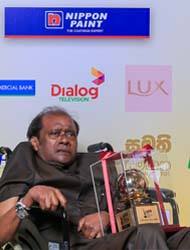
Mr. Priya Suriyasena
Madawala Liyanage Don Sarathchandra Priyadarshi Suriyasena Liyanage was later popularly known as Priya Suriyasena. Born on 27th October 1949 in Nattandiya, the only son in the family, he was educated at Nattandiya Primary School and Madampe Central School.
Priya Suriyasena, who has served as a social activist, music director, composer and teacher, began his artistic career under the guidance of his father, a poet. He became a singer who became popular overnight with his first song broadcast on the radio. His singing career, which began in the 70s, has now spanned five decades. Priya, who has delighted audiences with a large number of songs including “Etha Ran Viman”, “Mage Lamada”, “Adaraniyya Neranjana”, “Sudu Parevi Rana Se”, studied music at Haywood College. Since then, he has won many awards for his singing and was a singer who never left the concert stage when he joined the Kelaniya Gurukula College as a music teacher in 1971. Later, he also worked as a professor at Kalubowila College and Dehiwala Central College but said goodbye to the teaching profession to devote himself full-time to music.
Priya, a simple singer of the Sri Lanka Broadcasting Corporation's "A" grade, released her first cassette under the Tharanga label, earning the distinction of being the second singer in our country to release a cassette. Priya Suriyasena, who has sung many songs to the tunes and music of famous music directors in the country, stands out among the popular songs sung to his own music and tunes, including "Heta Dawase Apa Dehe", "Mata Vasana", "Sanda Ma Gawai", "Gela Wata Banda Wu Muthu Pote", and "Mage Samarum Pote". All of his songs, which he also composed for other singers, have won the hearts of his fans. Priya Suriyasena, who was the dream prince of the youth of the 70s, was also popular as a playback singer in films. Among them, the song "Kendhan Yannam Ran Mal Mala Dalai" from the film "Ethin Ethata", which won him the Best Singer award at the Sarasavi Awards, is a standout. The Once in a Life Time U. W. Sumathipala Memorial Award this year Priya Suriyasena, who is both a veteran and an expert in the art of singing.
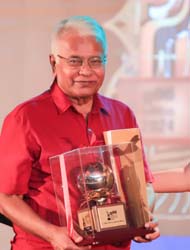
Mr. Dharmasiri Bandaranaike
Born on 6th October 1949 in Wadduwa, Dharmasiri Bandaranaike is later recognized by the Sri Lankan people as an excellent actor, stage and film director and screenwriter. Our hero was a hero in blending socio-political reality with civil society through his artistic creations.
Dharmasiri, who started his artistic career on the school stage while studying Advanced Level at Horana Vidyathanaya, was able to hone his innate talents through it. Playing a role in the play "Sudhu Etha Awata Pee" created by the veteran playwright Hemasiri Liyanage, who was a teacher at the school at that time, was a very important milestone in his artistic career. After completing his school education, Dharmasiri Bandaranaike, who joined the government as a clerk, got to know several well-known playwrights of the island at that time and also got the opportunity to act in their stage plays. "Makara", "Jasaya saha Lenchina", "Dunna Dunugamuwe", "Stree", "Beckett" are among Dharmasiri's stage performances.
He was able to make a name for himself as an award-winning actor at the State Festival. Dharmasiri won an award for stage acting for the first time for his performance in the play "Beckett". Gradually turning to cinema and stage as his mediums of expression, he left a more indelible mark on the stage with his first stage direction, Ekadhipathi, which won the Best Production and Best Actor awards at the State Drama Festival. Dharmasiri, who later brought the play “Makara” to the stage as “Makarakshya” and then left an indelible mark on the Sri Lankan stage with his stage direction plays “Dhawala Bheeshana”, “Yakshagamanaya”, “Trojan Women”, not only left an indelible mark on the Sri Lankan stage but also won many awards for acting and direction. Dharmasiri Bandaranaike managed to win the extremely rare honor of winning the Best Direction award at the State Drama Festival for all the stage plays he directed.
He made his debut in cinema by directing "Hansa Vilak" and made a name for himself as the greatest director produced by Sri Lankan cinema by directing films such as "Thunweni Yamaya", "Suddilage Kathawa", "Bawa Dukha Ha Bawa Karma". He has also made a name for himself as a documentary film director who has shared the social reality identified through life experiences through artistic creations. "Bak Maha Deege", "Palagetio", "Veera Puran Appu", "Heweneli Eda Ninthiya", "Bamba Ketu Hati", "Satara Pera Nimithi", "Muhudu Lihini", "Bora Diya Pokuna" are other films in which he has acted. Among the awards he has received in his career spanning five decades, a special award can be mentioned as the honorary award received from the renowned Manchester University. When presenting the award, he was introduced and He is considered one of the most acclaimed artists of the modern era in Sri Lanka who has dedicated his life to social justice. The recipient of the once-in-a-lifetime U. W. Sumathipala Memorial Award this year is the distinguished artist, Dr. Dharmasiri Bandaranaike.
Year 2023
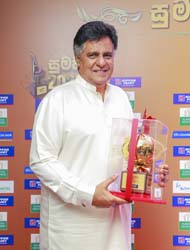
Mr. Sanath Gunathilaka
Among the young actors who entered cinema in the eighties, Somasiri Sanath Julian Gunathilaka, who was a prominent youth, born on October 27, 1955 in Kandy studied at Kingswood College Kandy. He got the lead role in the movie "Sithukumariyo" as he got selected from the panel of directors Vijaya Dharmasri and Malani Fonseka at the interview he faced based on a advertisement published in a newspaper while he was working as a tutoring teacher in Kandy.
The first film he acted in the 1980 movie "Ganga Addara" directed by Sumitra Peiris and produced by Milina Sumathipala made a remarkable record breaking revenue and had been awarded with Presidential and Sarasavi Honors. Here in after Sanath performed in “Meet again" - "Sasara Chetana" - "Dinumai - "Raja Vadkarayo "Obatai Priya Adarai” - Sujata" established himself as a star of popular cinema with 17 films "Silver Valley" - "Friends - Second Journey - "Sati Puja Films Spiced up his acting talent. His dedication to realistically recreate the role of Aravinda in the movie "Viragaya" is a great role model for aspiring actors. He was awarded as the best actor. He played many anti- hero roles without thinking about the image. He also played dual roles and wrote and produced the screenplay of the movie "Sisila Gini Kannini".
Sanath is also writing the screenplay of this film based on a story by Emil Zola. The next film he directed was "Sinahawa Athrin". Sanath, who joined the small screen in Titus Thotawatte's Ran Kahavanu teleplay, promoted as the chairman of the Sri Lanka Television Corporation. Sanath Gunathilake will come on live theater on a strange role in Costa's “Panang Bandina Gus” teledrama. This time, the outstanding actor Sanath Gunathilaka was honored with the once- in- a- lifetime U.W. Sumathipala Memorial Award.
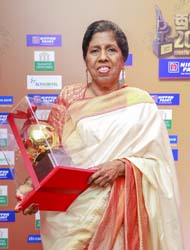
Mrs. Indrani Perera
The singer who sang the song "Dilhani Duwathi Nada Nidiyanne" fifty years ago became an overnight hit. She was non other than Indrani Perera. Three daughters born to the family of Alahendrage Abepala Perera and his beloved wife Muriel Perera they were brought up in Gampola. Their three daughters formed a group in late 1980’s known for their beautiful vocals and composed, became popular and aligned as “Three Sisters”.
Mallika Perera, Indrani Perera, Irangani Perera sang "Indunil Indunil Mini Kata Paradavana", "Indunil Menika", "Mihiri Gee Gayala", "Adaree Gee Gayala" and "Gala Ewura Rasa" new songs which were most popular.In 1988, Mallika, the eldest member of the "Three Sisters" group, passed away. The group "Three Sisters" became inactive after the death of Mallika, who was a film background singer. After that Indrani, sang duel songs "Pauru Wallak Bandhala" with Annesli Malewana, "Kageda Gon Wassa" and "Kiri Kavadi Lapalu Sevane" with Clarence Wijewardene who composed the melody of for the song “Mathakaya Asuren sihiyata Gannata Nitharama Vehesunemi” purely in remembrance of her loss beloved mother.
Born on February 15, 1950 in Gampola, Alahendrage Indrani Perera, who studied at Stafford Women's College, Colombo, studied music under the direction of Mr. B. Victor Perera.
She joins the film singing with the duet song "Pawan Susum Ralin Veli" sung with Devananda Vaidyasekhara in the movie "Taranga" and the song "Irata Akeekaru Handa Akeekaru" in the movie "Dinum Kanwanu" for which she became popular background singer.
Further, she sang the song " Vasanthaye Mal Kekulai " for the movie "Sikuru Liya " the first ever Clarence Wijewardena’s film music composition.
The audience who watched "Sikuruliya" said that it was a song sung by Suvinita Weerasinghe, who acted in it. Indrani's voice suited Suvinita wonderfully. Indrani sang 'Pemrasa Vahena Mangala Geete Jeevite ' with Victor Ratnayake, the song comes from the movie "Forever You Are Mine". "Samanala Ranak Se" sung by Milton Mallavarachchi in the movie "Sanakeliya" is another popular movie song of Indrani.
Indrani expressed her gratitude to all those who helped her come thus
far in the era of her life of music. An once-in-a-lifetime tribute of U.W. Sumathipala Memorial Award for the year 2023 goes to the excellent singer Indrani Perera.
Year 2020
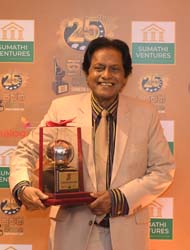
Mr. Douglas Ranasinghe
It would be really fitting if lovers of the art are fortunate to view Douglas Ranasinghe in action when he starred in a host of films such as Vragaya Yuganthaya Kelemal Yuvathipathi Kulageya and Thana Giravi as well as in teledramas like Avasada Ran Masu Uyana and Kalu Hansayo. It spoke volumes of the telling capacity of Douglas’ talents that enriched the stage and silver screen.
Uddeta Mang Giya
Gani Gedara thiya
Mage Yaluwo mang ena thuru
Unde Balagani Nirathuru
You may remember this duet sung by Copral and his buddy in the Hunuwataye teledrama. It was sung by Douglas a good 54 years ago by Douglas who was an actor new to the scene in the role of Copral and his buddy. Did you know that it was he who first sang Ariyamal? That was in 1967 in the first round performance.
Lester James Peiris who watched Douglas' performance was so taken up by him that he selected Douglas Ranasinghe to play the role of Samarasena in his film Akkara Paha. He went on to make a mark in Henry Jayasena's Apata Puthe Magak Nathe teledrama portraying the character of an undergraduate in which Iranganie Serasinghe played the part of his mother.
He played leading roles in teledramas such as Hotabari Yudde Kuweni Dung Dung Bere Janelaya Kusa Pabawathie Vanisaye Welenda The Wedding and Timing of the Sorrow.
Whilst a radio artist and sound administrator Douglas joined Law College in a pursuance of multi career paths. From there he proceeded to entering the London Film School in further flaunting his film career. In 1969 his role in G.D.L. Perera’s film Romeo and Juliet as Siridasa and as Tissa in Kalemal and Jinaraja in Yuwathipathi and Suresh in Saranga and Pala in Thana Giravi and teledrama roles in 'Amanthaya' 'Wathsala Akka' 'Yuganthaya' 'The Cristal Book' 'Kulageya' 'Adara Githaya' 'Bawana' (short film) masked films was to propel Douglas to fame by winning the OCIC Swarna Sanka and Sarasavi awards.
Born on May 27 1942 in Pothuhera in the Kurunegala District Douglas Ranasinghe who was educated at St. Anne's College Kurunegala was interested in joining the Police and Army. But his fate was so destined to take to a career as a vocalist and teledrama and film actor. Ass a stage artist Douglas went on to showcase his latent talent through the directing of 'Avasada' 'Ranmasu Uyana' and 'Kalu Hansayo' 'Aganthukayo' and 'Mama Mahalu Wayase'.
Douglas who has succeeded in endearing himself to us then and now as the simple Man for any Season artist earned the singular honour of winning the once in a lifetime U.W. Sumathipala Memorial Award.
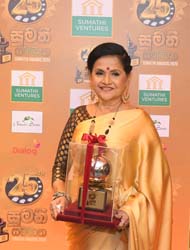
Mrs. Manel Wanaguru
Manel Wanaguru arrived to the Sinhala cinema in 1958 as a child artist by virtue of the inborn talent inherited from her film director father Dudley Wanaguru. Her foray into acting was through the Shirley Blithe child character played in the film 'Wanaliya' directed by B.AW. Jayamanne. During her childhood she was chosen to also play the character of a limping child in B.A.W.'s 'Sasara Duka' teledrama. She went on to appear as a young teacher in her father Dudley Wanaguru's film 'Segawunu Menika'.
Manel Wanagu made her appearance on the silver screen in 1974 as Joe Abeywickrama's lover in 'Sadahatama Oba Mage'. She was to forge further in a sequence with Bandu Samarasinghe to Freddie Silva's rendering of 'Gigiri Jagari Hadawana' and as Meena in the film 'Nilla Soya' and as Nilmini and Seetha in three dimensional roles cast together with Gamini Fonseka. You may remember this and her role as Ravindra Randeniya’s lover in an extraordinary sequence to the accompaniment of a song duet Nilla Nagana Swarna Kikini Rawe Yowana Uyane Piyum Thatake Pem Pem Hada Pawe Miyuru Pem Mandirawe rendered by Milton Mallawarachchi and Angeline Goonetilleke in the film 'Tharanga'.
Making her mark through a series of popular films from 'Asha Desin' 'Eka Diga Kathawak' 'Namal Renu' 'Pem Kurullo' 'Sabitha' to 'Sithaka Suwada' a hallmark of Manel Wanaguru's film career was that she was never categorized to any particular role. She cut a niche in varied roles from lover to the comic and wicked roles starring with distinction. Some of her cut above films roles were in 'Cheriyo Holman' and ‘Nuba Nadan Apata Pissu' as well as teledramas produced by her such as 'Dewlo Doni' and 'Suba Rathriyak'.
Born on October 18 1951 Manel Chinthamani Wanaguru is an old girl of Good Shepherd Convent Kotahena. Married to popular cinema and teledrama actor Ananda Wickramage the couple are blessed with two sons Janith and Sangketh.
Manel Wanaguru had the honour of being decorated with the once in a lifetime annual U.W. Sumathipala Mamorial Award.
Year 2019
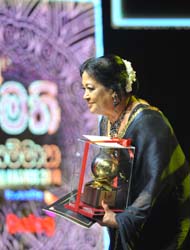
Mrs. Sumana Amarasinghe
Denipii Vithanage Sumana Amarasinghe, who caught the public gaze as a popular actress in the 1970s, was born on February 21, 1948. Sumana, who was educated at Bauddha Balika Vidyalaya, Mt. lavinia and Kalubowila Buddhagosha Vidyalaya, first acted on the school stage portraying the character of Diktala in the Angutumitta drama. She won the Avurudu Kumari contest conducted by the Dehiwala Madya Maha Vidyalaya in 1965 and came first in the talent contest conducted in connection with the staging of the Hindi film, Mare Lal in Sri Lanka.
That same year Sumana succeeded in landing second place in the talent show for pretty faces conducted by the Janatha Newspaper. It was to pave the way for Sumana to take to film acting. She broke into the cinema when Sumana got the break to act when she caught. the eye of Ruby de Mel who was a judge in the Janatha talent show. Ruby, who was directing the film, Kala Kala Pipena Kumudu, cast her in the role of a girl in an orphans home. Sumana, who went on to star as the wife of L. M. Perera in the film, Hathara Peraliya, met her life partner Roy de Silva while doing the sets on that film.
The subsequent Roy-Sumana combination proved to be the turning point in the duos film careers through several box office hits by their creation of films such as Sunethra, Sukiri Kella and Obai Mamai. These films were directed by Joe Dev Ananda. Sumana was soon on her way making a name through a host of roles. Sumana made it big going on to play several demanding roles depicting society life. Some of the telling roles Sumana portrayed were that of a disgruntled wife in the film, Diulika, and as Rajini in Mihidum Sihina, and dual roles in in Thana Giravi as the mother of a doctor and Nayana and as Ranjini in Kadawanu Poronduwa, as the innocent mother in Gedera Budun Amma, and the role of a villain in Cheriyo Doctor. Of all the diverse roles she played, it was in the film, Sudu Piruwata that Sumana stood out earning plaudits in her film career.
For the first time she sang a duet with Roy de Silva titled, Samanela Kumariyo, Sumana’s film career reached its pinnacle when she ascended to the heights of producer of films directed by her husband. She also distinguished herself as a model and was the proprietor of ‘Salon Sue’.
In an acting career that was launched in 1967 starring in Pipena Kumudu, of the multitude of roles she played Sumana was outstanding in films such as Singapore Charlie, Suhada Pathu,ma, Lokuma Hinawa, Me Deya Kumatada, Sinahawai Enawai, Sadana, Mangala, Sudu Paraviyo, Nila, Tom Pachaya, Niwena Ginna, Baba Ketu Hati, Jodu Walalu, Pethi Gomara, Sumithuro, Birida, Thathi Mang Adarei, Madu Sihina, Okkoma Rajawaru, Cheriyo Doctor, Cheriyo Darling, Re Daniyel Dawal Migel, Johnson And Gonsan, and Love 2002.
Sumana Amarasinghe’s film career was decorated by the once in a lifetime U. W. Sumathipala Commemorative Award.
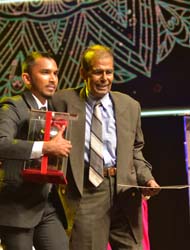
Mr. Alaxander Fernando
Alex has taken top billing in his film career by distinguishing himself in creating combat roles which has set him apart as an outstanding figure in lighting up the Sinhala cinema by such pulsating scens. In the 1950s era the local cinema was filled by the creation of artificial combat scenes. By the 1960s era the local cinema succeeded in forging life like very enlivening combat creations not witnessed even in the Indian cinema. There were a selective few actors who thereby emerged to the fore. One of them was Joseph Manual Alexander Fernando who was born on August 25, 1940 in Kochchikade at Kotahena.
Educated at St. Anthony’s and St. Benedict’s College, Kotahena, Alex was very proficient in the art of combat in several diverse fields such as mallawapora, boxing, water karate and football judo which he forged theming on diverse physical exercises. Alex, who emerged victorious at the 1962 Commonwealth Mallawa Pora Championship went on to represent Sri Lanka at the 1964 Tokyo Olympics and the 1966 Asian Games in Bangkok. Alex, who cut a niche as the undisputed mallawa pora champion since 1969, served as the sports advisor at the Colombo Municipal Council for some time. Lenin Moraes who was impressed by watching Alex star in Rajendra’s Juliu Caesar, Salomi and other Tamil creations, introduced Alex as a combat actor through his film, Wena Swargayak Kumatada. Thus, Alex Fernando was to cement his name as a combat actor through his projection by Robin Fernando in the film, Ruhunu Kumari. Some of the explosive combat films Alex was to make a mark were Ataweni Pudumaya, Ohoma Hondada, Haralakse (Wire), Singapore Charlie, Adath Suraya Adath Suraya, Widuru Gewal and Sikuru Liya. Alex gained further recognition as a combat actor having played the second lead role in Weerasena for the first time in Titus Thotawatte’s. He went a step further playing the lead role as Danny (Samantha), Saraliyelge Putha (Siri), Harima Badu Thunak, Shri Madara, (Susil), Ege Adara Kathawa (Siripala) and Pasamithuro (Tamil prisoner). He received the support of Yasapala Nanayakkara, Niel Rupasinghe, Sathischandra Edirisinghe, and Ananda Hewage who recognized the specialty in the man in such a challenging art. Alex who went on to win Presidential Awards, was spurred on to adding impetus to his combat actor status by paying attention to evolving his physical outlook to playing the roles of the villain and a hero. He also made a mark in stage plays such as Yamalowa Peraliya and Siripala ha Ran Menika.
Alexander Fernando evolved his talent to the next level of directing such films like Athma Puja, Saradiyelge Putha, Sahayata Danny, Age Adara Kathawa, Shri Madara, Subani and Pasumithuro. It is significant that Alex has played various roles in as much as 100 films. These include Abirahasa, Suhada Divi Piduma, Thushara, Sanakeliya, Lassana Kella, Raja Gedera Pareviyo, Suraya Surayamai, Sikuru Liya, Sadana, Hithuwoth Hithuwamai, Maruwa Samaga Wasi, Yakadaya, Hari Pudumai, Menik Maliga, Jaya Apatai and Ninja Sri Lanka.
Alexannder Fernando had the distinction of being honoured this year as the proud recipient of the once in a lifetime U.W. Sumathipala Commemorative Award
Year 2018
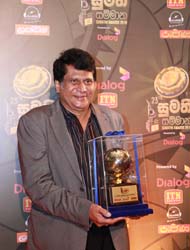
Mr. Thissa Wijesurendera
Indrani Wijayabandara, who cut her teeth as a child singer over radio by her rendering of goodwill songs, succeeded in becoming a famous household name in a 65-year long record career in the field. Her voice making an impact to radio listeners in 1951 through songs like 'Lowapura Rav Naga'. Her renderings for radio programmes and for Chandraratne Manawasingha's radio plays like 'Sona Gang Thire' endeared her to listeners in a big way.
Tissa Wijesurendra launched his acting career in the 1970s starring in Ranjith Lal's production "Nimwalalla" and went on to scale the bar by winning recognition to play the lead role in the film 'Kalana Mithuro'. He went on to play the role of a failed lover alongside popular actresses such as Malini Fonseka, Geetha Kumarasinghe, Nita Fernando, Sumana Amarasinghe and Janita Samarasinghe who had lit up the silver screen in a short period since their foray.
Blessed with an outstanding physique and a characteristic witty smile a notable feature about Tissa Wijesurendra's film career was his versatility in decorating the local cinema as a stand out true romantic actor.
A strong point to his success was Wijesurendra translating his acting career to becoming an indispensable actor in the commercial cinema circuit who was able to hold his own among such illustrious actors in that era such as Gamini Fonseka Vijaya Kumaranatunga and Tony Ranasinghe. It is also significant that Tissa Wijesurendra rose in stature as a lead actor lighting up the local cinema in several box office hits during a 46-year career playing the lead role in as many as 65 films during his time.
It is indeed a fulfillment that this veteran actor who became a household name having cut a nice in films such as "Ran Kurullo", "Honda Hitha", "Sudu Pareviyo" "Suhada Pathuma", "Kalana Mithuro", "Lasada" "Lassana Kella", "Nedeyo", "Sithaka Suwanda", "Bonikka" "Krishthu Charithaya" "Nelum" "Samanmali" "Juriya Obai" and "Senehasaka Kandulu".
He went to the next level of etching his name in history to have decorated his name in the rare glow of becoming the recipient of the once in a lifetime "U.W. Sumathipala Commemorative Award".

Mrs. Geetha Kumarasinghe
Born with a silver spoon, Geetha Kumarasinghe has gone down in the annals of the Sinhala Cinema blessed with an inherent talent of lighting up the silver screen who has succeeded in creating a dimension of an all-time great actress by starring in innumerable roles showcased particularly by the lead actress roles she has starred in.
The eldest daughter of a media personality namely Vijaya Kumarasinghe and Udula Kumarasinghe, Geetha, who was born in 1995, had her primary education at Aluthgama Sangamitta Girl’s School and St. Paul's, Kalutara. Proficient in acting and as a vocalist as a school girl, she stood out in both fields during her school career. Such was her craving as a teenage actress that Geetha displayed a great liking to star in Punya Heendenioya's films.
She made her foray as a promising young actress having emerged the beauty queen pageant conducted by a local newspaper in 1973. Geetha Kumarasinghe made such a stunning impact that she created a record when she was signed up for 21 cinema roles even before she came on board with her maiden film appearance. Having caught the eye by her maiden appearance in Niel Rupasinghe’s 'Lassana Kella', she went on to star alongside famous actors such as Gamini Fonseka, Vijaya Kumaranatunga in Tissa Wijesurendra.
Some of her popular roles were portrayed in such films like 'Maruwa Samaga Wasi', 'Anjana', 'Koti Waligaya', 'Siribo Aiya', 'Yukthiyada Shakthiyada', 'Kolomba Sanniya', 'Pembara Madu', 'Maha Gedera', 'Karumakkarayo', 'Palama Yata', 'Rajya Sewaya Pinisai' and 'Kiri Suwada'. Of the multitude of roles Geetha played she became a big hit by her roles in 'Pembara Madsu Gee' as Dalsi and Doitti in 'Palama Yata', Punna in 'Loku Duwa' and as Amila in 'Randiya Dahare'.
Geetha also cut a swathe by starring in several international films where she made an impact starring in the Southern India Tamil cinema film 'Mohana Punnage' playing the role of Gari alongside popular South Indian actor Sivaji Ganeshan in 1981.
She has crowned herself in the top status quo of national awards, OCIC Cinema Awards, Sarasavi Awards, Signis Cinema and Swarna Sanka Cinema awards. She stood out when Geetha went on to make her day basking in the fame of landing several top awards at the same awards ceremony such as best actress, popular actress, best film producer. In her several decades long career, Geetha has exalted herself superseding the boundaries of a highly distinguished film career by also endearing herself as a well-known social activist. She reached the pinnacle of her career when she was decorated with the coveted once in a life time "U.W Sumathipala Commemorative Award" at this year's Sumathi Awards.
Year 2017
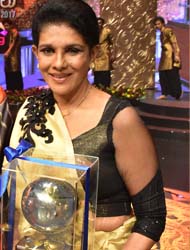
Mrs. Neeta Fernando
Nita Fernando has gone down in the annals of the Sinhala Cinema as a star studded actress who decorated local filmdom by her classic portrayal of a multitude of roles, particularly highlighted by the lead roles she has played.
Educated at St. Paul's, Wenmnappuwa, Nita launched her education career spurred by her parents at becoming a teacher. However, she ended up by her attraction to the local cinema for which she is ever grateful to her uncle who showed her the way. Following her education career, Nita took to film acting by her role in 'Ladakage Mahimaya' in 1965 and in the next eight decades she had made a name as a top actress having starred in a record number of nearly forty films. Some of her famous roles were flaunted in films such as 'Duhulu Malak', 'Lasada', 'Hadawath Netho' and 'Mangala'.
She tied the knot in 1975 with attorney-at-law Alien Perera and re-launched her film career a second time in 1983 appearing in the film, 'Sooryakantha'. A high point of it was that Nita Fernando rose to the heights of producer of the film as well by which she set a record in local cinema. Subsequently, she went on to win several local as well as international awards in 1998 consequent to which Nita set out to produce the film, 'Pawuru Walalu'.
Nita scaled the bar by acting alongside such famous names such as Gamini Fonseka, Joe Abeywickrema, Vijaya Kumaranatunga, Tony Ranasinghe and Ravindra Randeniya among others and made a mark by the film, 'Duhulu Malak'. She went on to cut a niche through such film productions like 'Parasathumal', 'Saroja', 'Bishanaye Athuru Kathawak' and 'Pawuru Walalu'.
Nita's biggest moment in her film career came in 1998 when she won the Best Actress award at the "International Singapore Cinema Awards" which put her in the forefront among the top Sri Lankan actresses of her time. Some of her major awards included the 1999 Presidential Award, The Critic's Award and the 1997 and 2000 OCIC Awards. Nita Fernando capped her film career when she was honoured by the once in a lifetime "U W Sumathipala Commemorative Award.
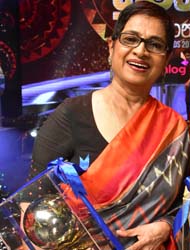
Mrs. Swarna Mallawarachchi
Swarna Mallawarachchi, who has risen to the highest echelons in a stellar five decade long career to hogging the spotlight as one of Sri Lanka’s premier actresses has indeed risen above a multitude of obstacles in endearing herself as a darling of the silver screen. The high point of Swarna’s career has been the character within her of surmounting a thorny career such as economic and social hardships amidst political victimization which she won over by making the silver screen the stage to personifying her battle against such vagaries.
Indeed, Swarna Mallawarachchi, now in the Everest of her film career as a veteran, has engraved her name in gold to posterity by winning the hearts of Sri Lankan fans by devoting her entire cinematic career to portraying the ideals that she stands for in winning over the hazards in life. Shed has maximised the attributes of simple charm and charisma powered by the powerful captivating attribute to holding the floor to dazzling audiences by the lead as well as supporting roles that has projected her to sky high as a heroine of the local cinema. The undoubted specialty in Sumana has been her ability in playing the most trying lead roles of the village heroine relating to the social trends of the time.
Having broken into acting as a school girl in 1966, Swarna Mallawarachchi became an instant hit starring in professor Siri Gunasinghe’s now famous film, Sath Samudra’ that has taken a special place in the history of Sinhala cinema. Thereafter, she proceeded to catch the public gaze by . Since then, Swarna took a break from acting by going overseas and on her return after four years before making her reappearance.
Since breaking into the limelight by her compelling role in ‘Sath Samudra’, Swarna has etched her name in local filmdon as the star projecting a saga of a persecuted woman who has won over oppression in life.
It is in perspective to say that Swarna reached the pinnacle of her career by winning the top once in a lifetime U.W. Sumathipala Commemorative Award.
Year 2016
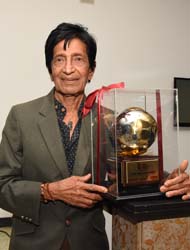
Mr. Amarasiri Kalansuuriya
Kalansuriya made his first film appearance alongside Vijaya Kumaratunga in Hanthana Kathawa. His next film Ahas Gauwa won him a best actor award in 1974.
Kalansuriya, who lost his mother at the age of 17, was left to take care of his three brothers. He worked as a casual laborer earning RS 1.75 per day. Subsequently he began his career from the Agricultural Department in Mahiyanganaya as a minor worker. After that he worked as a lance corporal in Sri Lankan army for six years. Later he worked at Mallika Studio in Kandy, before moving to the Lion Cafe, Kandy.
Following a quarrel with a boss he vowed to not work under anyone pursuing less strict work saving up Rs. 300 and started a successful small business selling clothes in Kegalle and Peradeniya.
Kalansuriya took to acting on an invitation from H. D. Premaratne to star in the film Apeksha in 1978. His second film after the hiatus, Parithyagaya, won him more awards from OCIC and Sarasaviya. He won Best Supporting Actor for Puja in Presidential Award in 1986. Kalanasuriya had a leading role in the first television serial made in Sri Lanka, Dimuthu Muthu directed by D. B. Nihalsinghe. After another hiatus, Kalansuriya returned to film with Shilpa Denumena in 2001.Directed by Rodney Widanapathirana. Notable films Kalansuriya starred in were Sugathapala Senarath Yapa’s Hanthane Kathawa in 1969, H.D. Premarathna’s Apeksha 1978, and Dr. Lester James Peiris’ Akkara Paha 1970. Sunil Ariyaratne’s Anupama 1978, Dharmasena Pathiraja’s Ahas Gauwa 1974, Vimal Waidyasekera’s Tharanga 1975, Dharmasena Pathiraja’s Bambaru Awith 1978
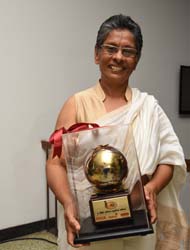
Mrs. Anoja Weerasinghe
Anoja Weerasinghe is an actress and producer, known for Island (1989), Siri Medura (1989) and Maldeniye Simion (1987).
Anoja Weerasinghe soared in popularity in cinema and acclaim after winning the Silver Peacock Award for the Best Actress at the New Delhi International Film Festival in 1987 for her role in the film Maldeniye Simion, directed by Dr. D. B. Nihalsinghe and produced by Vijaya Ramanayake for Tharanga Films. Thus she became the first Sri Lankan actress to win a best actress award at an international film festival. Thereafter she further fine honed her skills at the LAMDA in London and going on to win acclaim nationally and internationally: She has been honored with the Kohinoor Award by the Governor of Tamil Nadu, Government of Sri Lanka's ''Kala Suri national award, the Asian Film Center tribute to her in 1994, Munich International Film Festival retrospective of her films, and the state governments of Kerala and West Bengal retrospectives of her films are among the many accolades she has received.
She acted in Paul Cox's movie Island in 1989.
Year 2015
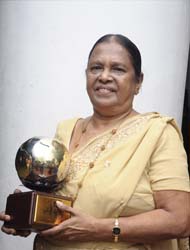
Mrs. Indrani Wijayabandara
Indrani Wijayabandara, who cut her teeth as a child singer over radio by her rendering of goodwill songs, succeeded in becoming a famous household name in a 65-year long record career in the field. Her voice making an impact to radio listeners in 1951 through songs like ‘Lowapura Rav Naga’. Her renderings for radio programmes and for Chandraratne Manawasingha’s radio plays like ‘Sona Gang Thire’ endeared her to listeners in a big way.
She further catapulted to fame by such songs like ‘Dalada Perahera’, ‘Elahena’, and ‘Namal Komali’. She went a notch higher as playback singer to Lester James Peiris film, ‘Rekawa’ in 1956. Indrani Wijayabandara has indeed created a lasting impact on song lovers, her popularity as strong as it was then by her renderings of ‘Sudu Sandaeliye’ and ‘Vesak Kekulu’. She has the rare distinction of becoming the first Sri Lankan female vocalist to win the Depashika Award for the Best Female Playback Vocalist in films for ‘Rekawa’ in 1957. It is also significant that Indrani met her partner in life, Sisira Senaratne on board a flight to India for song recordings for ‘Rekawa’. The chapter she forged in the local music industry together with Sisira is time immemorial. This is best illustrated by their vast number of songs. These include ‘Nuhuru Nupurudu’, ‘Etha Ahasay Nagi’, ‘Gaya Githayan’, ‘Sayura Wetha Yana’, and ‘Adarani Sujatha’ ‘Kavuda Hari Hi’, ‘Ridi Kumari, ‘Senehasa Hi’, ‘Obay Nadaya Kowulo’, and ‘May Wage Handa Peyu’.
Indrani’s timeless film playback songs range from ‘Suraya’, ‘Hithannako Aiye’, ‘Handapana’, ‘Oba Nathi May Bima’, ‘Hithata Hitha’, ‘Handapane Mal Pipuna’, ‘Kawuda Hari’, ‘Ridi Kumari’, ‘Senhasa’, ‘Obay Nadaya Kowulo’ and ‘May Wage Handa Peyu’.
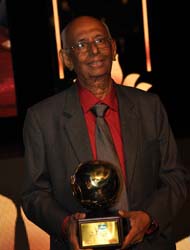
Mr. A. D. Ranjith Kumara
A.D. Ranjith Kumara was born on April 7, 1947 at Kosgashandiya, Grandpass, and educated at Ananda College, Colombo. He was only 22 years when he became the assistant director for the the film, ‘Nim Walalla’ in 1970 . Ranjith made his foray to the cinema as an outstanding journalist as a sub editor and editor of the film tabloid, ‘Sarasaviya’ at Lake House for over quarter century from 1969 to 1995. He went on to become the Editor of ‘Sarasi’. He has the rare distinction of serving as the Director, Organising Committee of Sarasaviya Film Festival for a record 17 years, and Sumathi Awards Festival 20 years. His overall 50 years service organising film festivals in Sri Lanka is unique. He also distinguished himself as an author on books, some of which were ‘Gamini’, ‘Hela Sinamave Sakvithi’, ‘Kosgas Handiya’, ‘Rukmani Devi’, ‘Ugayaka Swarna Gi’, and ‘Adasiyawasaka Ridi Reka’.
Year 2014
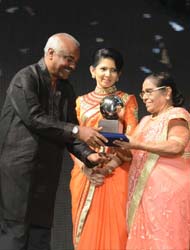
Mr. Rohana Weerasinghe
Rohana Weerasinghe, born on July 18, 1949 in Blackpool, Nuwara-Eliya where his father was the village headman, became a perfectionist as song writer, singer, cinema background singer, and film song director in an unique four decades.
Educated at the Nuwara-Eliya Convent, Gamini MV, Nuwara-Eliya, Welimada Central, and Dharmapala Vidyalaya, Pannipitiya, Rohana was joint best music director along with H.M. Jayawardene in the award winning film ‘Aradhana’. Thereafter, he was music director for films such as, ‘Sathya Kanya’, ‘Seilama’, ‘Visi Dela’, and ‘Keli Madala.’
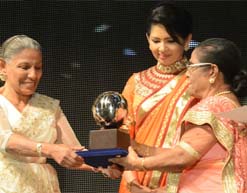
Mrs. Sujatha Attanayake
At school concerts sujatha and her younger sister Ranjani Perera would sing and dance. Sujatha appeared in the public limelight when she sang the radio song, ‘Mal se Dileva’ on October 10, 1950. Her big break came In 1956 with Sujatha Attanayake’s talents being quickly noticed by the local film industry.
Her maiden playback song was “Mage Podi Muwa Patiya” for the film "Sohoyuro" in 1958. In 1967 Miss.Sujatha Perera got married to Nawaratna Attanayake.They have three sons.
Sujatha was so gifted that she lost no time in reaping award success by 1965 she received the Swarna Sanka Award for the song Duka Ena Kala from the film, ‘Yata Giya Dawasa’ by Karunarathna Abeysekara And R.Muththusamy. Some of her most popula playback songs are “Oru Pada Kiri Muhude”, “Piya Salana Egillee”, “Putune Me Ahanna”, “Malsarata Premaloke”, “Onchilla Thotilla Koheda, “Chandrame Ra Paya Awa”, “Adere Mandire”,’Sanda Rajniyo Sudo Mama Adera”.
Year 2013
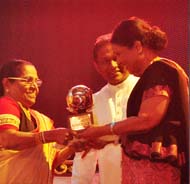
Mrs. Punya Heendeniya
She came to the public limelight having cut her teeth in the art of dancing under the renowned Pani Bharathi. She appeared as a dancer in Sirisena Wimalaweera’s film, ‘Asoka’. Punya succeeded in translating from dancer to film lead roles displaying the versatility of portraying exemplary society women. Punya performed in a volume of films such as ‘Suneetha’, ‘Sri 296’, ‘Deyange Rate’ was the Best Actress award at the maiden Sarasavi Festival for the role Nanda in Martin Wickramasinghe’s novel ‘Gamperaliya’.
She also played award winning lead roles in ‘Parasthu Mal’ (Kamala), and ‘Ransalu’ (Sujatha). Punya Heendeniya, who quit acting after marriage.
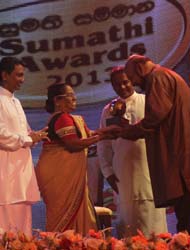
Professor Sanath Nandasiri
Gifted with a born talent, was introduced as a child singer to the Ceylon Broadcasting Corporation by Nanda Jayamanne. Having cut his teeth as a tabla drummer under Visharada D.R. Peiris, he entered the Bath Kanda Music University in Lucknow, India where Sanath Nandasiri fine tuned himself in the art.
He succeeded in becoming the youngest Sri Lankan to obtain the Visharada Degree from the Bhath Kanda Music University in Lucknow. Sanath lost no time in touching popularity by his early career songs, ‘Evulunu Gini Del’ and ‘Mahada Pem Vile’. He went on to become a super grade table drummer and singer over the radio.
He married fellow artist, Malkanthi in 1971. He succeeded in becoming a film playback singer in ‘Sadol Kandulu’, going on to do so in a vast number of award winning films. These included ‘Hanthane Kathawa’, ‘Ahas Gawwa’, ‘Duleeka’, ‘Vishmaya’, ‘Wasantheye Dawasak’, ‘Mangala Thegga’, ‘Indrakilaya’, and ‘Salambak Handai’. Professor Sanath Nandasiri has put his vast music knowledge in to book form for the benefit of the reading public.
Year 2012
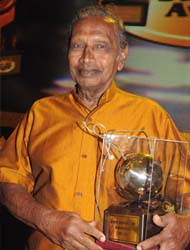
Mr. Cyril Wickramage
Having obtained a Degree in Arts from the Sri Jayawadena pura University, Cyril Wickramage, who evinced a keen interest in bodybuilding as a youngster, underwent training in acting under Sri Jayana. He was discovered and introduced to the field by Gunasena Galappathi, and broke in to stage drama in the early 1960s. He was successful in decorating the stage figuring in a vast number of dramas that included ‘Devatha Eli’, ‘Kuweni’, ‘Thawath Udesanak’, ‘Dawasaka Venasa’, ‘Elowa Gihin Melowa Awa’, ‘Kada Walalu’, ‘Pabawathi, ‘Liyathambara’, ‘Nettukkaris Wesmuhunu’, ‘Ahasin Wetunu Minissu’ and ‘Idama’. Cyril Wickramage graduated in to filmdom in the role of Harama in ‘Handapana’. He pivoted to popularity playing the lead role in ‘Sath Samudura’. Other films he starred in were ‘Wesgatho’, ‘Walmathuwo’, ‘Bambaru Avith’, ‘Soldadu Unnehe’, ‘Sudilage Kathawa’, ‘Sira Medura’, ‘Palama Yata’, and ‘Ambu Samiyo’, ‘Sihina Lowak’, and ‘Karadiya Walalla’, the last two which he also directed. He also made a name acting in a large number of tele dramas, some of the main ones being ‘Nubanadan’, ‘Senehelatha’, ‘Palingu Menike’, ‘Mihikathage Daruwo’, ‘Gawwen Gawwa’, ‘Ella Langa Walawwa’, and ‘Kande Gedera’. He also served as a director at Tower Hall Foundation.
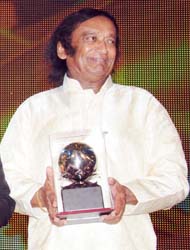
Mr. Victor Ratnayake
Blessed with a natural talent in music and singing which he mastered as a profession under the wing of the famous music guru R.A. Chandrasena. He made his foray in to the field in 1963 singing his first song called ‘Devagatha Paradana Komala Katha’ for the radio play, ‘Manichora’. From the 1960s, Victor Ratnayake turned out as the violinist for a large number of films.
On becoming an A Grade radio singer, he graduated from the State music institution. It was to set Victor Ratnayake on what would be his long music odyssey that has today set him apart as a scholar in the art. His initial songs, ‘Pawe Wala’, and ‘Soka Senasuma Wedanawan’ were extraordinarily instant hits. While serving as a music teacher at several schools, Victor broke in to the cinema by the song, ‘Sara Soduru’ for the film, ‘Hanthane Kathawa’ thus cementing his name as a cinema playback singer. From there Victor experimented diversely in song making going on to become a forceful authority vastly enriching the local music industry. This is best illustrated by his time immemorial songs such as ‘Hopal Wana Petha’, ‘Thani Tharuwe’, and ‘Thotupola Aiyne’.
Making his maiden film music direction for ‘Mathara Achchi’, Victor progressively propelled to fame as a film music director kissing award fame. His award winning record songs include ‘Sarungalaya’, ‘Podi Malli’, ‘Siribo Aiya’, and ‘Hulawali’.
Victor Ratnayake was the first Sri Lankan musician to hold a live one-man concert; His concert known as "SA" was first performed in 1973, and was an instant success. in 1973. It marked a giant chapter in the field with Victor becoming a colossal music personality. University of the Visual and Performing Arts took a generous and a bold decision to honour Victor Ratnayake with a Doctorate for the yeomen service he has rendered to the nation.
Year 2010
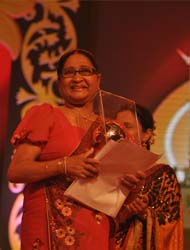
Mrs. Anula Karunatilleke
Born on 22 January, 1946, and educated at Sri Lankadhara Balika Vidyalaya, Wellawatte, actress Anula Karunatilleke counts 50 years in the film industry. In 1962 she won the ‘Davasa Rupasundari’, and in 1963 broke in to stage drama becoming ‘Best Actress’ as Devika in ‘Ranthodu’. Anula stepped in to prominence in films starring as Laisa in ‘Gamperaliya’, and playing the lead actress in ‘Chandiya’ next to Gamini Fonseka in ‘Parasathu Mal’ she also starred in ‘None’ next to Gamini who played Bonny Mahathaya. Anula Karunatilleke’s popularity spiraled by lead roles in the famous films. ‘Ransalu’, ‘Golu Hadawatha’, ‘Mokada Wune’, Seethala Wathura’, ‘Miemesso’, ‘Penawa Neda’, and Nedeyo. She also acted in Sugath Devapriya’s tele drama, ‘Amba Yaluwo’.
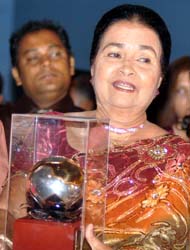
Mrs. Angeline Gunatilleke
Born on December 23, 1939 in Matara, and educated at St. Mary’s Convent, Matara, Angelina De Lanerolle alias Angeline Gunatilleke cut her teeth as a child songstress under the tutelage of Sunil Shantha. She entered the cinema as background singer in the film, ‘Sohuyuro’.Teaminmg up with H.R. Jothipala she went on to cut a niche ushering a memorable song era to this day. Her series of famous songs included ‘Honda Siriyawai Akase’, ‘Suhada Madura Premaya’, ‘Pata Podak Thilakala’, ‘Amara Pemlathawe’, ‘Era Sanda Wendala’, ‘Sulang Kurullo’, ‘Balanna Asai’, ‘Sanda Thaniwela’, ‘Bangali Walalu’, and ‘Punchi Putha Mage’.
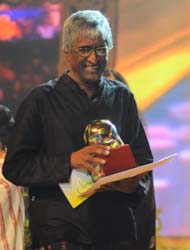
Professor Sunil Ariyaratne
Professor Sunil Ariyaratne obtained BA Honours from Sri Jayawardenapura University, and passed in the Tamil Language Certifite Examination from Madras. He was a Lecturer at Kelaniya University, Jaffna University and Sri Jayawardenapura University, and is a senior professor.
Professor Sunil Ariyaratne is a colorful cinema personality as a veteran film director, song writer and Screen script writer. He cut his teeth in cinema as song writer for ‘Nim Walalla’. He went on to compile classical, national, cinema, and tele drams songs from long research in the fields. He has also researched several song related publications. In 1978 Sunil Ariyaratne broke new ground as film director of ‘Anupama’. This was followed by ‘Sarungalaya’ ‘Podi Malli’, ‘Siribo Aiya’, ‘Christhu Charithaya’, ‘Sudu Sevaneli’, ‘Uppalawanna’, and ‘Paththini’.
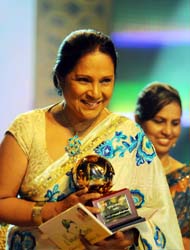
Mrs. Sriyani Amarasena
From her school days, Sriyani showed a flair for music by stage performances as a vocalist. Having gone on to perform in Siri Aiya’s child stage musical shows, Sriyani entered stage acting starring as a village daughter in ‘Nari Bena’. She went on to make an impact in popular stage dramas like ‘Hitha Honda Ammandi’, Kusa Pabawathie’, and ‘Wesmuhunu’. She took her acting career to the next level starring in short films like ‘Wings Over Ceylon’. Her big break was acting in the Lester James Peiries movies ‘Golu Hadawatha’, ‘Dasa Nisa’, ‘Ahasin Polowata’.
Her first production was Dath Kekulu Pala. She has since helmed three television serials made partly in London for Sri Lankan audiences. The first two, Ira Bata Taruwa and Hemanthaye Wasanthayak, were telecasted on Rupavahini to high ratings. Sriyani is married to journalist Arthur U. Amarasena and credits him for providing the support to become an actress.
Year 2009
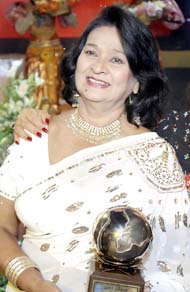
Mrs. Clarice De Silva
Clarice De Silva, who etched her name as an indelible influence to the local film industry as a dominative actress in the 1950 to 1960 eras, was born in 1932 in Borella, Colombo. Educated at St. Bridget’s Convent, Colombo, she entrenched her name as a prominent actress by her role in ‘Mathalan’. Her role therein playing the character of the village lass, Chitrawallige remains the cornerstone in Clarice’s film career. Other films by she made her mark in were ‘Ramyalatha’, ‘Sohoyuro’, ‘Kala Kala De Pala Pala De’, ‘Sulalitha Sobini’, ‘Adarayai Karunawai’, ‘Allapu Gedera’, ‘Iwasana Dana’, ‘London Hamu’, ‘Ataweni Pudumaya’, ‘Kohomada Wadey’, ‘Hari Maga’, ‘Athma Puja’, ‘Uthum Sthriya’, ‘Pancha’, ‘Rosi’, ‘Gedera Budun Amma’ and ‘Mamai Raja’. She was also a playback singer in the films, ‘Purusha Rathnaya’, ‘Suhanda Diwi Piduma’, and ‘London Hamu’.
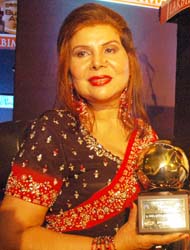
Mrs. Jeewarani Kurukulasuriya
The most famous and dominating actress of the 1960 decade. She first broke in to the arts in a song duet with Thilakasiri Fernando of ‘Gammanaya Kala Eli Uva’. She became popular as an actress starring in the stage drama, ‘Mahene Riri Yaka’. Her first film role was playing a small part in ‘Sandeshaya’. Her maiden lead role was in ‘Wira Wijaya’. She achieved overnight fame by her lead role in ‘Ranmuthu Duva’ as Kumari, and a large number of film appearances. She won the hearts of local audiences for her characteristic innocent lover roles. Her key lead role appearances were in ‘Adata Wediya Heta Hondai’, ‘Udarata Menike’, ‘Depasika’, ‘Yata Giya Davasa’, ‘Saravita’, ‘Senasuma Kothenada’, ‘Delowak Athara’, Oba Dutu Da’, ‘Bicycle Hora’, ‘Singithi Surathal’, ‘Indunil’, ‘Senehasa’, ‘Sumudu Barya’, ‘Sheela’, ‘Sithadevi’, ‘Hathara Kendaraya’. Jiwarani also figured in a song duet with Narada Disasekera.
Year 2008
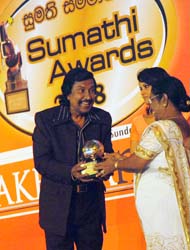
Mr. Roy De Silva
Roy de Silva is an actor, film director in Sri Lankan cinema. He entered the film industry as an actor in 1964 in ‘Sujage Rahasa’ directed by Palaniyaandi Neelakantan. He also played a combat role in a motorcycle chase in the film, ‘Lokuma Hinawa’. Some of the major films he has acted in to date are ‘Sihasuna’ (Carl), ‘Sagarika’ (Danu), ‘Bicycale’ (Kalu Mahaththaya), ‘Mandira’ (Sakkara Mama), ‘Koji Waligaya’ (Sergeant Silva), and ‘Christhu Charithaya’ (Pilath). Other films include ‘Senasili Suvaya’, ‘Ruhunu Kumari, ‘Hathara Peraliya’, ‘Sinagppur Charlie’, ‘May Das Kumatada’, and ‘Sunethra’. Significantly, Roy directed ‘Bicycale’ and also sang a playback song for the film.
Having made a mark as an actor, Roy moved to cinema direction, becoming one of Sri Lanka's most successful film makers. As a film director, he created blockbuster movies such as ‘Re Daniel Dawal Migel’ series, ‘Cheriyo’ series, ‘Clean Out’, and ‘Sir Last Chance’ which were economically successful and made hallmarks in the industry. Other film directions included ‘Thana Girawi’, ‘Kadawanu Poronduwa’, ‘Sumithuro’, Hitha Honda Kollek’, ‘ Thathi Ma Adarai’, ‘Gedara Budun Amma’, ‘Hitha Honda Puthek’, ‘Cheriyo Doctor’, ‘Sudu Piruwata’, Cheriyo Darling’, ‘Raba Saha Madu’, ‘Re Daniyel Dawal Migel’, ‘Pem Kekula’, ‘Johnson And Gonson’ and ‘Sepata Dukata’. Roy has won second place in a radio song contest. As a film director he came to the limelight as co-director of ‘Tom Tom Pachaya’.
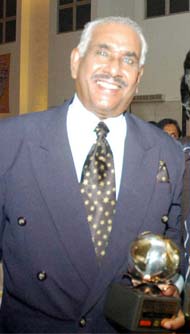
Mr. Rex Kodipilly
Rex Kodipilly, who is popular for breathing new life to the local cinema playing the villain character, was born in 1939 in Badulla, and educated at St. Bridget’s, and Shri Sidharatha Vidyalaya. He joined the Army Intelligence before entering the cinema. Having played the villain role in ‘Kathuru Muwath’ in 1971, Rex Kodipilly next featured in the film, ‘Lokuma Hinawa’ in 1971 figuring in a deadly combat scene in a motorcycle chase. He has since to date acted in 139 films. Among these, ‘Sihasuna’ (Carl), ‘Sagara’ (Danu), ‘Bicycalaya’ (Kalu Mahathaya), ‘Mandira’ (Sakkara Mama), ‘Koti Waligaya’ (Sergeant Silva), and ‘Christhu Charithaya’ take pride of place. In ‘Bicicalaya’ Rex had the distinction of producing the film, apart from acting in it while also rendering song. He initially stamped his name as a compelling stage dramatist featuring in a host of dramas before breaking in to teledrama acting in ‘Ran Kahawanu’.
Year 2007
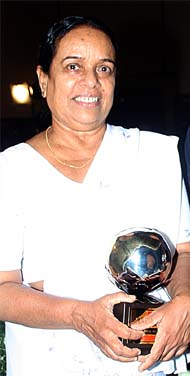
Visharada Nanda Malini
Nanda Malini is easily the doyen or Queen of the female species of classical music. Born on August 23, 1943 in Kotahena, and educated at Gunananda Vidyalaya, Nanda Malini Perera, possessed a remarkable talent as a child songstress which she showcased on the children’s segment of the Ceylon Broadcasting Corporation, and at age 19 in 1962 she broke in to overnight fame as playback singer of several songs for the first local colour film, ‘Ranmuthu Duva’. It earned her several awards at the Sarasaviya Film Festival.
Among her popular songs during her early career were ‘Me Sinhala Apage Ratai’, ‘Ruwan Wala Duhulu Kadin’, ‘Baloli, Baloli’, ‘Ammawaruni’, and ‘Handahawun Hande’. Her early top award winning songs were ‘Saravita’, ‘Sadol Kandulu’, ‘Adarawanthayo’, ‘Monarathenna’, ‘Siribo Aiya’, ‘Sathara Pera Nimithi’, ‘Sivranga Sena’, ‘Sithala Gini Kandu’, ‘Gedera Budun Amma’, ‘Ambu Samiyo’, ‘Miharaka’, ‘Pera Raja Dahana’, and ‘Yasa Isuru’. With the advent of television, Nanda Malini was in the forefront of award winning fame by a vast number of songs. She also has the rare distinction of being film music directress for ‘Baba Ketu Hati’. She also revolutionized cassette music in a big way in winning public acclaim.
Nanda Malini appeared on Amaradeva's programme Madhuvanthi singing the songs "Sannaliyane" and "Ran Dahadiya Bindu Bindu." Her string of successful releases depicts realistic life situations, love, relationships, and emotions. The songs "Pipunu Male Ruwa", "Sudu Hamine", and "Kada Mandiye" attest to her effort to expose the hearts of women. Some of Nanda's popular songs, such as "Manda Nawa Karanawa", show a humorous and sensitive account of a young woman's experience of loneliness.
In 1971, Nanda broke new ground teaming up with music guru, the legendary Pandit Amaradewa in the Srawana Aradhana concert. In 1973 she started her first solo concert series, and after having 530 shows the series ended on May 22, 1979. In August 1981 she started another concert series ‘Sathyaye Geethaya’. She played 500 shows and ended in August 1984. She conducted her next solo musical concert series Pavana in June 1987 which ran for 18 months with 205 shows. After 22 years her newest solo musical concert titled ‘Shwetha Rathriya’ was held in 2010.
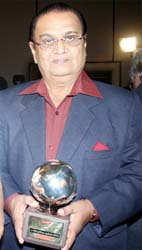
Mr. Stanley Perera
Playing the lead role as John Jayapala in the film, ‘Kele Handa’ in 1953, Stanley Perera hogged the limelight as a prominent actor of the 1950-1960 eras.
Born in Dummaladeniya in Wennappuwa in 1933, and educated at Joseph Vas College, Stanley broke into local filmdom in the film, ‘Kele Handa’. He went on to star in a range of films that earned him popularity. These included ‘Irangani’, ‘Dupathage Duka’, ‘Kendare’, ‘Hathara Maha Nidanaya’, ‘Vanasara’, ‘Akka Nago’, ‘Ewasana Dana’, ‘London Hamu’, and ‘Ruhunu Kumari’. Stanley Perera graduated to film director in 1977 as co-director of ‘Tom Pachaya’. He next directed ‘Sada’ going on to spearhead the formation of the National Film Corporation. He passed away in 2011.
Year 2006
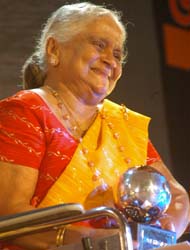
Mr. Shanthi Lekha
Irene Rita Coin alias Shanthi Lekha, who was born in Kalutara South in July 1929, is renowned in the local cinema with having played the most number of mother roles. Having schooled at St. Pauls College, Kalutara, Shanthi Lekha was known as a Katakali dancer. She was to subsequently break in to stage acting before launching her film career as a mischevious younger sister in the film, ‘Sujatha’.
Her film acting career progressed having been cast as Mathara Hamine in ‘Gamperaliya’ in the wake of starring in ‘Warada Kageda’, ‘Dosthara’, ‘Sandeshaya’, and ‘Salli Malli Salli’. Amidst a glow of acclaim, Shanthi Lekha progressed to make an impactful household name in trademark mum roles in a large number of films. These included ‘Parasathu Mal’, ‘Sithala Wathura’, ‘Binaramali’, ‘Thunmanhandiya’, ‘Eya Den Loku Lamayek’, ‘Sasara Uthumanani’, ‘Mayurige Kathawa’, ‘Sagarayak Meda’, ‘Hithawathiya’ and several other films. She also starred in tele dramas including ‘Dimuthu Muthu’ and ‘Rekha’. Shanthi Lekha won Best Supporting Actress awards from every major Film Festival in the country. She passed away in 2009.
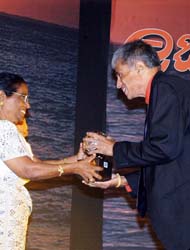
Deshabandu Shan Wickremasinghe
Shan Wickremasinghe is the eldest son of Edmond Wickremesinghe - Asia’s first Golden Pen Award winner, and Nalini Wickremasinghe, daughter of newspaper Byron D.R. Wijewardene. Born on December 20, 1945, and educated at Royal College, Colombo, Shan Wickremasinghe obtained a degree in television media from the North London Polytechnic.
In 1968 he made a giant stride to forge television to Sri Lanka. He went on to cut a swathe in fulfilling his vision as the Sri Lankan to pioneer the television age to the country. This was by setting up the Independent Television Network on April 13, 1979 thus creating a grand, new era for the television viewers of Sri Lanka. Indeed, Shan Wickremesinghe basks in the rare distinction of having accordingly brought to viewers the first ever television programme from the ITN situated at the Sangeetha Recording Company. It was subsequently taken over by the State, but it did not stop Wickremasinghe’s vision as he went on to establish the now famous TNL creating a pathway for others to follow.
Year 2004
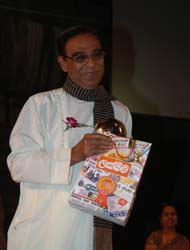
Mr. Wijeratne Warakagoda
A complete actor and broadcasting technologist, Rajakaruna Navaratne Atapattu Mudiyanselage Wijeratne Banda Warakagoda was born in 1933 in Harispattuwa, Kandy, and educated at the RomanCatholic School, Marawila, and Ananda Colllege, Colombo.
He joined the police service before showcasing his proficiency as a vocalist. In 1960, he came to the limelight by his rendering of ‘Menike Hinehenawa’. His popularity grew through the song, ‘Rangahala Den Etha Ada Aduray’. Wijeratne Warakagoda paved his name further in the popular radio play, ‘Muwanpelessa’ running for a record half a century. He won the Best Actor award for his role in the Ajasatha drama going on to make a name as a stage actor. His popular stage roles were in, ‘Maname’, ‘Kuweni’, and ‘Hunuwataye Kathawa’. His film roles ranged from ‘Suhada Divi Piduma’, ‘Gam Peraliya’, ‘Adarayai Karunawai’, ‘Golu Hadawatha’, and ‘Mahene Riri Yaka’. He won the Presidential Award starring in ‘Arunata Pera’.
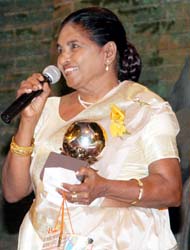
Kalasuri Latha Walpola
Latha Walpola is one of the country’s greatest of vocalists who has decorated the local music industry in the glow of special award winning fame. She is to Sri Lanka what Latha Mangeskar is to India. Her popularity was heightened by her marriage to another famous singer, Dharmadasa Walpola who was one of the most talented of his kind who excelled as a film playback singer.
Born in 1934 in Mt. Lavinia, and educated at St. Anthony’s College, Mt. Lavinia, Latha Janet Fernando cut her teeth in music teaming up with C.T. Fernando in several duets such as ‘Lo Ada Ninde’. Her talent, underscored as a church choir girl brought her early success by her rendering of the now famous ‘Namo Mariyane’. Her talent opened the door to film playback singer status with Latha’s maiden song being for ‘Eda Re’. She was to touch popularity almost overnight or by her next song, ‘Honda, Hondama Weya’ for the film, ‘Prema Tharangaya’. She went on to do so for the films, ‘Lankaren Malak Pipi’, ‘Mihira Pennadi’, ‘Ivasanu Hande’, ‘Tharu Komali’, and ‘Pem Mala Gotha’. With greater success, Latha Walpola shot to fame as a household name to this day as play back singer for over 100 films winning award after award. Among these were ‘Adare Run Wimane’, ‘Nilmini Sangi Pavi’, ‘Hinehenna Romeo’, ‘Hina Hathakmada’, ‘Dedunnen Ena Samanalune’ and ‘Siyumali Rosa Male’
Year 2003
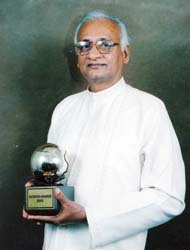
Kalasuri Sathischandra Edirisinghe
Highly gifted in the local arts with an immense natural flair to grasping the broader all-round perspective of the local cinema, Sathischandra Edirisinghe did showcase this abounding talent in a record award winning performance spanning just 90 seconds. He achieved this rare feat playing a role in ‘Koti Waligaya’.
He made his entrance to the acting profession at a very young age dubbing as a child star, Devadantha in the radio play “Seriwanija”. His role influenced the producer of the stage play ‘Wessanthara’ to slot Sathischandra in a part. Soon the young star was on his way cutting a niche mark in stage drama. ‘Ane Massina’, ‘Erabadu Mal Pottu Pipila’, ‘Maha Gedera’, ‘Cheri Uyana’, ‘Liyathambara’, ‘Manaranjana Wedawarjana’ were some of the many dramas he featured in.
His versatility sped Sathischandra to filmdom making his maiden appearance in 1966 in the film, ‘Sampath’. He went on to act in the films, ‘Sadol Kandulu’, ‘Pujithayo’, ‘Podi Malli’, ‘Hima Kathara’, ‘Christhu Charithaya’, and ‘Wekanda Walawwa’, before graduating as a film director and scripting tele dramas. Going on to play tele drama roles in ‘Thara Devi’, ‘Mihikathage Daruwo’, and ‘Susima’, Sathischandra also directed the following tele dramas ‘Malwara Nekatha’, ‘Kokila Ginna’, ‘Namalgolla’, and ‘Andurata Eliyak’. Significantly, he has decked himself with several awards as an actor, and remains a colossal influence to the local cinema and tele drama in creating a better tomorrow for local audiences.
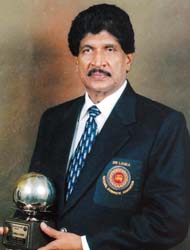
Mr. Robin Fernando
The name Robin Fernando is synonymous with the local cinema for the largely villain impact he has infused to it in several decades. Blessed by a prowess in physical combat and sound physique, Robin
While employed at Mackwood Company, Robin forged to the cinema starring in ‘Chandiya’. He propelled to lead role status in ‘Kapatikama’, ‘Bicycle Hora’, ‘Sengawena Sewanella’, ‘Sorungeth Soru’, ‘Hathara Kendare’, ‘Pini Bidu’, ‘Ruhunu Kumari’, ‘ Kawuda Hari’, ‘Singappur Charlie’, ‘Sihasuna’, ‘Hara Lakshaya’, ‘Siripala Ha Ran Menika’, ‘Hasthi Wiyaruwa’ and a host of other films. Robin Fernando subsequently turned film director in ’Sura Duthiyo’, and ‘Ninja Sri Lanka’. In ‘Ninja Sri Lanka’, he had the distinction of directing and producing the film. He was also a film script writer. He also cut a mark as Combat Director in the film, ‘Sasara Chethana’. Robin also had the rare honour of starring in the German film, ‘Destination Island’ as Assistant Police Commissioner.
Year 2002
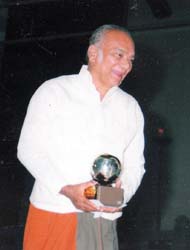
Mr. Henry Jayasena
A versatile and perfectionist stage drama actor who was instrumental in redefining it by putting it on a new and far reaching pathway. Educated at Nalanda College, Colombo, Henry’s immense talent came to the fore significantly as a child character in radio plays. He went on to enter the teaching profession from where he produced national stage dramas while also distinguishing himself as a leading script writer and producer in the field.
He made his foray in to the popular stage acting in ‘Handahana’, ‘Meti Karathaya’, ‘Rathnawali’, ‘Hasthikantha’, ‘Manthare’, ‘Wedagathkama’ and ‘Maname’, the last two which he also produced. Other dramas he scripted and produced were ‘Wedagathkama’, ‘Thawath Udesanak’, ‘Manaranjana Wedawarjanaya’, ‘Kuweni’, ‘Ahas Maliga’, ‘Hunuwataye Kathawa’, ‘Apata Puthe Magak Nethe’, ‘Makara’, and ‘Diriya Daruwo’. Jayasena, who passed away on November 11, 2009, is best remembered for his role in the long running popular tele-drama, ‘Du Daruwo’ which won the hearts of audiences making him a household name.
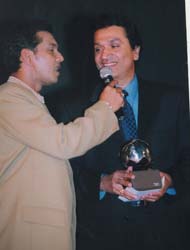
Dr. Ravindra Randeniya
Ravindra Randeniya, by all accounts, is the contemporary leading film actor in the local film industry. He basks in the flamboyance of a compelling personality appeal that has set him apart as local cinema’s super star actor.
Having made an impact in the drama, ‘Mudu Puththu’, Ravindra forged in to films playing an impactful lead role in ‘Kalu Diya Dahara’. He went on to star in diverse roles appearing in a series of films such as ‘’Tharanga’, ‘Desa Nisa’, ‘Ganga’, ‘Duhulu Malak’, ‘Siripala Saha Ran Menika’, ‘Wira Puran Appu’, ‘Higana Kolla’, ‘Sathveni Davasa’, ‘Ek Davask Re’, ‘Aradhana’, ‘Re Manamali’, ‘Dadyama’, ‘Hima Kathara’, ‘Janelaya’, ‘Sandakada Pahana’, and ‘Wekanda Walawwa’. Several of his portrayals spiraled him to award winning fame. He also made a mark in a series of stage dramas such as ‘Wes Muhuna’, ‘Idama’ and ‘Julius Caesar’. He also went a notch higher breaking in to international films such as ‘Mother Teressa’, and ‘Reincarnation’. He subsequently entered politics going on to be elected as a Member of Parliament.
Year 2001
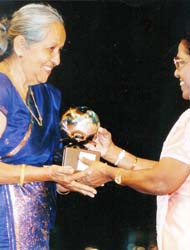
Kala Keethi Iranganie Rokshana Mideniya
Acting was in Irangnie’s blood excelling in school and university English dramas like, ‘The Second Mice Tanker’, ‘Antagony’, ‘Ghost Bloodquefen’, ‘Government Inspector The House of Bernarda Alva’, ‘Caucasian Walk’ and ‘Circle Othollo’.
She went on to specialize in drama at the Bristol Old Wick Theatre School of Speech Training and Dramatic Art in the UK. She returned portraying in a series of short films by Lester James Peiris. Her maiden appearance in the lead actress role in ‘Rekawa’ won the hearts of audiences. She went on to etch her name in the local cinema by roles in top films like ‘Sandeshaya’, ‘Delowak Athara’, ‘Oba Dutuda’, ‘Ransalu’, ‘Bakmahadige’, ‘Sagarayak Meda’, ‘Himakathara’ ‘Loku Duwa’ and ‘Wekanda Walauwwa’.
Iranganie also endeared herself to local tele drama audiences as an award winning actress in ‘Yasoravaya’ and ‘Dudaruwo’ which came with the advent of the television to Sri Lanka. She is the first Sri Lankan actress to obtain an international professional qualification in theatr and drama from Bristol Old Vic Theatre School for a year and the London School of Speech Training and Dramatic Arts.
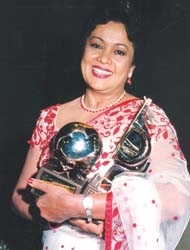
Dr. Malini Fonseka
Wanniarachchige Malini Senehelatha Fonseka is widely regarded as the Queen of the local cinema. An old girl of Gurukula Vidyalaya, Kelaniya, Malini underlined her prowess as a born actor from her school days acting stage dramas. Her major appearance as a school girl was in ‘Noratha Ratha’. Thereafter Malini became popular in a series of stage plays like ‘Akal Vessa’, ‘Sauren a Landa’, ‘Erabudu Mal Pottu Pipila’, and ‘Hiru Awarata Giyaden’. She won her first State award for ‘Best Actress’ in stage drama by her lead role in, ‘Akal Vessa’.
At age 21, Malini Fonseka forayed into film acting in ‘Punchi Baba’, and went on to star in famous films like ‘Den Mathakada’, ‘Hatharadenama Surayo’, ‘Edath Sooraya, Adath Sooraya’, ‘Thushara’, ‘Sadahata Obamage’ and ‘Sangeetha’. It spiraled her to award winning roles in high class films including ‘Akkara Paha’, ‘Nidanaya’, ‘Bambaru Avith’, ‘Eya Den Lokulamayek’. Malini capped her name in several Best Actress awards locally and internationally.
She graduated to director status directing ‘Sasara Chethana, ‘Ahinsa’, ‘Sanda Madala Sthri’. She had the rare distinction of starring in lead roles opposite with Gamini Fonseka, Vijaya Kumaranatunga, and Joe Abeywickrema.
Year 2000
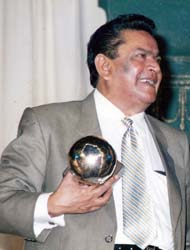
Mr. TONY RANASINGHE
Watching Tony Ranasinghe star in the film, ‘Delowak Athara’ in the 60s, the Indian film critic Karanjiya commented that he had not seen such a striking actor in the whole Asian region.
Tony entered the cinema industry in 1958 as an actor in the film, ‘Punchi Amma’, thanks to Arthur U. Amarasena and Sirisena Wimalaweera who spotted his talent. After a break, Tony reappeared in 1962 in the stage drama, ‘Boarding Karayo’ which was followed by a role in the stage drama, ‘Ran Thodu’. It earned him the ‘Best Actor’ award. He continued to play stage roles in ‘Thattu Gewal’, ‘Harima Badu Hayak’, ‘Waguru Bima’, and ‘Julius Caesar’.
Tony subsequently made a strong cinema comeback in Lester James Peiris’ epic film, ‘Gam Peraliya’ playing the role of Tissa. It propelled him in to roles in ‘Getawarayo’, ‘Senasuma Kothanada’, ‘Delovak Athara’, ‘Ransalu’, ‘Duhulu Malak’, ‘Baddgama’, ‘Ahasin Polowata’, ‘Parasathu Mal’, and ‘Ganga Addara’ among several other films. Tony’s stocks rose compiling film scripts including ‘Koti Waligaya’, ‘Kelimadala’, ‘Awaragira’, ‘Tharanaya’, and ‘Pawuru Walalu’.

Mr. CHRISTIE LEONARD PERERA
Christie Leonard Perera, became popular by songs such as, ‘Kulen Pola Pola’, and ‘Pera Apage Sinhala Kale’. His ‘Amma kiya pidiya haki Ekama Laddakatai’ were instant hits. Employed at the Cinemas Corporation, Christie broke in to the silver screen in the comedian role of ‘Gobo’. From 1954 to 1976 his popularity rose starring in films such as, ‘Radala Piliruwa’, (Thomas Aiyya), ‘Chandiya’ (Pina), ‘Diwarayo’ (Lennie), ‘Sundara Birinda’ (Baba), ‘Sura Chavraya’ (Papadam), ‘Adata Wada Heta Hondai’ (Wethara), and ‘Sakumali’ (Nikama)
Christie was also a background singer for ‘Ai Wade May Bayawela’(Sirimali), ‘Avilla, Avilla Rella Sibina Rella’ (Diwarayo), and ‘Adare Gagulelle’ (Surachauraya).
Year 1999
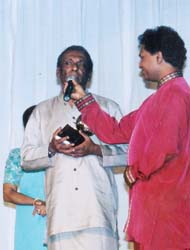
Mr. Joe Abeywickrema
Joe Abeywickrema was born in 1927 Lellopitiya, Ratnapura, and made his foray to the cinema in 1955 through ‘Deva Sundari’. Subsequently he starred in ‘Saradam’ and ‘Shri 296’ rising to popularity by his comic role in ‘Ranmuthu Duwa’.
Destiny beckoned Joe Abeywickrema as he progressively graduated from small roles to colour the local cinema as one of the greatest of actors defined by the rare ability to heighten the most innocuous of characters to applause winning status such as ‘Maldeniye Simion’. He broke to the limelight from ‘Saravita’ going on to etch a golden pathway by the rare characteristic of producing the most absorbing of portrayals that set him apart in the elite class. Record films Joe distinguished himself in were ‘Welikathara’, ‘Getawarayo’, ‘Sadol Kandulu’, Thunmang Handiya’, ‘Desa Nisa’, ‘Siribo Aiya’, ‘Soldadu Unnehe’, ‘Malata Noena Bambaru’, ‘Maldeniye Simion’ and ‘Purasanda Kaluwara’.
Among an array of awards was the rare distinction of becoming the only Sri Lankan to win an international award for Best Actor for his role in ‘Pura Sanda Kaluwara’ at the Singapore International Cinema Festival.
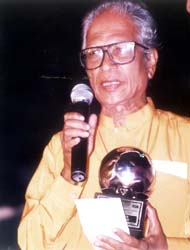
Mr. K.A.W. Perera
K.A.W. Perera alias Kothdul Arachchige Wilson was an English teacher before entering the broadcasting field as programme producer. Displaying a talent in script writing radio plays, he graduated to the cinema as script writer of the dialogues for the film, ‘Rekawa’ in 1956.
It propelled him to dialogue similar scripting among several other films, ‘Getawarayo’, ‘Saravita’ and ’Pirimiyek Nisa’, distinguishing himself as co-director in the latter. His first film production was ‘Senasuma Kothanada’ going on to direct, ‘Bicycle Hora’, ‘Lokuma Hinawa’, ‘Kathuru Muwath’, ‘Ehatha Athmaya’, ‘Kapatikama’, ‘Nedeyo’, ‘Dulika’, ‘Lasada’, ‘Higana Kolla’ and ‘ Dawala Pushpaya’ among others. K.A.W. Perera won the OCIC International Award for his direction of ‘Lasada’.
Year 1998
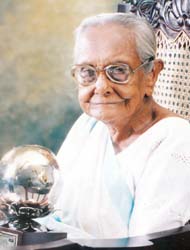
Mrs. Denawaka Hamine
Dona Georgiana Meraya Denawaka, who was born in 1906 in Imbulgoda, Gampaha, was one of the most endearing elder characters to adorn the cinema screen. She broke in to stage acting in the stage drama, ‘Darkaya’ during her prime. After a lay off, she made a comeback at age 60 under the stage name Denawaka Hamine.
She graduated to award winning films like ‘Sama’, ‘Dahasak Sithuvili’, ‘Sath Samudara’, ‘Parasathu Mal’, ‘Sadol Kandulu’, ‘Hantane Kathawa’, ‘Matara Achchi’, ‘Desa Nisa’, ‘Kolomba Sanniya’ and ‘Arunata Pera’.
She broke new ground in internationally acting in the world renowned Stephen Spielberg direction, ‘Indiana Jone and The Temple of Doom’. Her role in the film, ‘Sath Samudura’ was praised by renowned world famous film critic Roger Manual.
Her contribution to the local tele drama industry was as enormous. She left an indelible mark by her role in the ever popular ‘Kopi Kade’ running for record years. Others included “La Hiru Dahasak”, “Kadaima”, Sihina Nimnaya’,”Siripalage Sihinaya”, ‘Pahan Tharuwa’ and ‘Hathpana’.
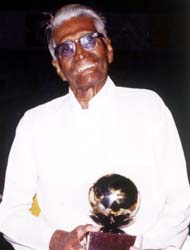
Mr. Hugo Fernando
He was popularly known as Hugo Master in the local film world. He had an over 30 year career as a character actor, lyricist, assistant director and music director.
His life was hard but his flair for the arts as a kid and his fondness for music was to steer him on a successful career in the local drama and film world. Having directed the music for the stage play, “Avatharaya’, Hugo Fernando debuted in the first Sinhalese film ‘Kadawanu Poronduwa’. He endeared himself to audiences for his diverse film roles. Some of his key appearances were in ‘Prema Tharagaya’, ‘Ahankara Sthri’, ‘Mathalan’, ‘Wana Mohini’, ‘Diwarayo’, ‘Allapu Gedera’, and ‘Sandeshaya’. His popular film song lyrics were ‘Sandyawe Shriya’, ‘Mage Saka Bambare’, ‘Honda Hondamawei Lova’, ‘Alankaren Malak Pipi’, and ‘Lokaya Peralei’. He was film music director for ‘Pitisara Kella’, and ‘Saradiyel’. He died on April 12, 1999.
Year 1997
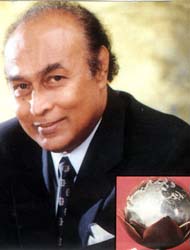
Dr. Gamini Fonseka
Gamini Fonseka was the complete superstar of the Sinhala cinema who distinguished himself in diverse areas from actor, director to producer. He was truly a legendary colossus who infused a new aura to the Sinhala cinema as a superstar actor. He left an enduring blockbuster image by a rare flamboyance that has endeared him to Sri Lankan film lovers to posterity. Literally, Gamini Fonseka and the Sri Lankan film industry are synonymous for the lasting impact he imparted. Gamini was a rare breed of his kind whose mere gaze was an audience binding marvel. His works put him in a different planet.
Gamini’s personality speeded him to an overnight super actor by his lead role in ‘Ranmuthu Duwa’. Thereafter, fame beckoned Gamini. He went on to playing Most Popular Actor award winning lead roles in ‘Diwarayo’, ‘Gettawarayo’, ‘Chandiya’, ‘Sura Chauraya’, ‘Hatharadenama Surayo’, ‘Edath Suraya, Adath Suraya’ and ‘Kawuda Raja’among other films. Subsequent compelling roles in ‘Gamperaliya’, ‘Parasathumal’, ‘Welikathara’, and ‘Sarungale’ among other lead roles saw Gamini Fonseka rise to colossal stature that was to transform the Sinhala cinema. Among the award winning films he directed were ‘Parasathumal’, ‘Sagarayak Meda’, ‘Uthumanani’, ‘Nomiyana Minissu’, ‘Mayurige Kathawa’, and ‘Koti Waligaya’.
Year 1996
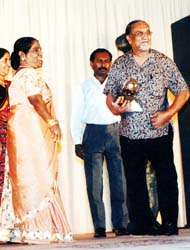
Mr. Titus Thotawatte
The name of Titus Thotawatte goes down in the history of the Sinhala cinema as one of the doyens in refining the sensitive area of film direction. Thotawatte’s rare input as a master in the art of film directing was a singular contribution in giving the Sinhala cinema several popular films during his prime. Born in 1929 in Borella, Thotawatte, who was educated at Ananda College, Colombo, made a lasting impact on the Sinhala cinema having joined the State Film Corporation as an editor.
He broke in to the limelight as a film script editor of “Rekava”. He was also the Editor for “Parasathumal” “Ran Muthu Duwa”, “Sarawita”, “Punchi Baba”, “Gatawarayo”, “Devarayo”, “Hantane Kathawa”. ‘Thotawatte’s maiden film Direction was ‘Chandiya’ starring Gamini Fonseka which won country-wide applause.
The film, ‘Handaya’ was a smashing success of international fame winning the Best Film Award at the Sonas International Film Festival in Italy.
Thotawatte was instrumental in The introduction of dubbing and subtitling to the Television industry
Year 1995
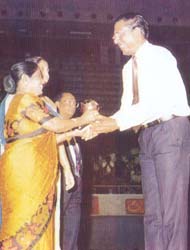
Professor D.B. Nihalsingha
Dr. D.B. Nihalsingha’s name is inseparable from Sri Lanka’s cinema and television industry to which he was a father figure. His illustrious contribution towards the upliftment of the Sri Lankan cinema in particular is inscribed in gold. His insight was such that Dr. Nihalsingha succeeded in creating a new order in the country’s cinema and television industry. He progressively rose to become one of Sri Lanka’s elite cinema doyens - a rare cinema administrator of the species. In perspective, Dr. Nihalsingha breathed a new modern technological aura to the local cinema and television by his deep seated technological know how acquired by in-depth overseas research. He rose to colossal stature as the pioneer in modern technology experimentation in taking the Sri Lankan cinema and television to the next level. Dr. Nihalsingha also cut a niche as a consultant in creating a new generation of cinema and television specialists both locally and internationally.